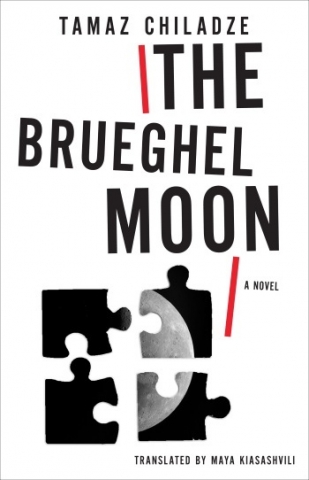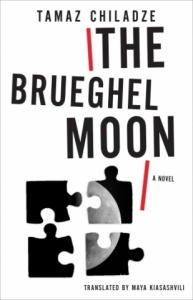Book Review: The Brueghel Moon by Tamaz Chiladze
“I could see something was very wrong with me. It looked like the onset of a nervous breakdown, but I couldn’t stop it. And still, most upsetting were the dreams, visions, or images – either caused by my depressed mood or the other way around – intensifying my dejected state with the strange sequence of a serial.”
Levan, a reputed psychiatrist, is successful in professional life but seemingly nowhere else. The dreary doctor’s melodrama begins when Ia, his bitter, pampered, and wildly emotional wife announces her decision to leave him.
She takes the couple’s young daughter with her and Levan is left almost entirely without family or friends. He withdraws deep into his own mind, drifting into a series of liaisons that bend the boundary between fact and fantasy.
The Brueghel Moon is one of three novels published by Tamaz Chiladze, well renowned in his home country of Georgia as a novelist, poet, and playwright. Mr. Chiladze presents a work that blends the genres of post-modernism, magical realism, and science fiction.
The novel is short, characterized by crisp bursts of prose, rich monologues, and a narrative that passes between Levan and the two women who enter his life after Ia’s departure – Nunu, Levan’s middle-aged former patient with a husband dead from suicide, and Ana-Maria, an ambassador’s wife who first meets Levan at a party.
This book is about marriage, madness, and mental frailty. But above all, it’s about isolation. Nunu’s personal story is equal parts tragic and absurd, ending in the Moscow psychiatric ward where she first comes into contact with Levan.
Ana-Maria is lonely and depressed, and her acting out spurs her husband to call Levan for help. At the crux of this triangle is the psychiatrist himself, a man of sharp intellect but lacking in emotional intelligence.
The story’s greatest tension comes when the author asks whether Levan should be the one giving psychiatric advice, or receiving it. It can be read as a Kafkaesque criticism of the social status quo, with “experts” exalted for their genius but serving little social purpose.
While being taken to the psychiatric ward Nunu shouts at her captor: “Why am I being transferred to the psychiatric clinic? Am I mad? … How do you know what is normal and what is abnormal? … How can you be so sure?” To this the bureaucrat replies icily: “The experts will shed light on that issue.” She is left in the care of Levan, a man unable to sort the mess of his own life, let alone that of someone else.
Some readers may find the plot aimless, the narrative difficult to follow, and the ending anticlimactic. Maya Kiasashvili’s translation is competent but, unavoidably, some of the text’s power is lost in translation. But without question Chiladze’s prose contains pockets of poetic grandeur. One passage of particular power comes from Nunu:
“Just like a drop of water on the tap rim, a leaf will detach itself from the branch, come spinning, sliding, gliding through the air, dancing to the music unheard of by us, fully succumbing to its rhythm. It’s still alive, or thinks it’s alive, but is now alone, solitary, left on its own, not part of the myriad of its kin any longer … It spins for some time but then, as if suddenly becoming heavier, starts to fall – sliding towards the ground, spreading itself on the earth. That how it finishes its life with a soft touchdown – dancing to the end.”
Chiladze’s novel can be interpreted in numerous ways. One vantage point is to view each of the characters, especially Levan, as akin to a leaf. Estrangement from family leads to detachment from reality. Each keeps moving but, like the leaf, are “now alone, solitary” and eventually starts to fall. This is a story about relationships. And the overarching lesson is that man and woman are better off together, than alone.
Joseph Larsen












